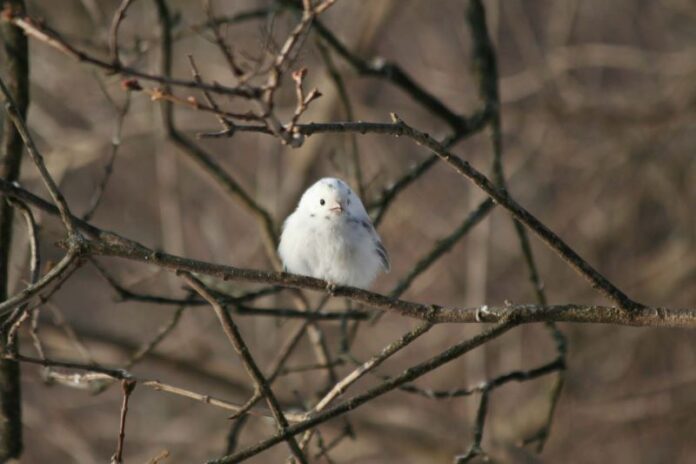by John Baldwin
In my recent articles, I have tried to highlight the more unusual birds that stop-over for the winter, particularly the Robins who, apparently, are doing it more often. The subject has prompted one of The North Grenville Times readers to bring my attention to their even rarer, year-round garden visitor, as you can see. At first glance, you probably had to do a double take at what you are looking at! Yes, you thought, “That’s a Black Capped Chickadee, but it’s white, so probably an Albino one.”
Whoops! Take another closer look, after you have sorted out in your own mind the distinguishing features of an Albino bird or animal. Obviously, the predominant white color is a giveaway, but now take a closer look, and what do you see? Albinos’ eyes are usually red, but the eyes of this little guy are black, so doesn’t make it an Albino Black Capped Chickadee, but a Leucistic one! To see one of these is a rare privilege indeed, having read up on the statistics of seeing one of these at all.
Our reader has a pictorial record of sighting one of them almost annually, although Chickadees are here all the time, since 2015! Knowing this, it begs the question – is it the same one, or can the genes, or lack thereof, be transferred during breeding, to reproduce a similarly affected bird in the next generation? I am certainly not an expert on any of these facts, so leave the research up to you. Just trying to find out how long a Chickadee normally lives is, in itself, not proving a very successful venture, using the usual sources of information. So, to say that this is, or not, the same bird each year is very difficult to conclude.
Another reader has come up with the question as to why we seem to be seeing more Crows in our neighborhoods this year, as compared to other years. Again, not being an expert, I can only theorize on the subject. Maybe it’s warmer in town, or there is more accessible food, easier to forage for in these extremely icy conditions and cold temperatures. Once again, I’ll leave it up to you and your own curiosity to find the answer. In doing so, please enjoy your research, but above all, stay safe and well.
Cheers,
John Baldwin




